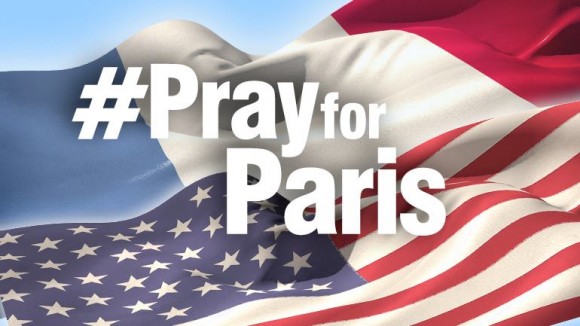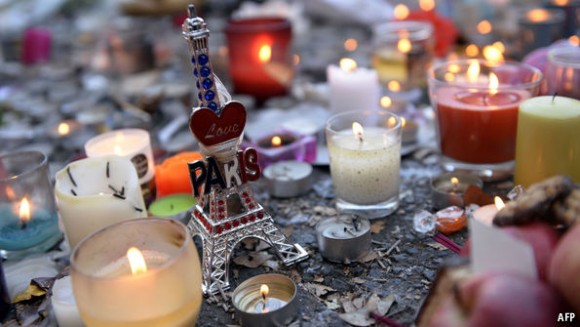
For the second time in 2015, Paris was the target of the terrorists. But, in contrast to the “Charlie Hebdo” massacre, the attacks were not made in the name of an idea, like freedom of expression — especially of the press, or to single out the Jewish community, but aimed at French society as a whole. The blind rampage was intended to butcher the greatest number of normal Parisians having fun on a Friday night.
The killings took place almost simultaneously in five places obviously following a well prepared scenario acted by three professional and heavily armed commandos. Never before had the French been exposed to kamikazes. The carnage left 129 dead, 355 injured including more than 99 in critical condition.

It all started at 9.20 p.m. at the Stade de France, north of Paris, on Friday, Nov. 13, where the Bleus were playing against a German soccer team in front of 80,000 spectators. President François Hollande was in the crowd. He left discreetly at half time. In spite of two explosions, the match went on uninterrupted to avoid the panic. Afterwards the public lingered on the lawn, still dazed. Spontaneously the crowd started singing the Marseillaise. Outside the stadium, the double suicide had left a scene of destruction. The social networks went to work. Taxis offered free rides. Twitter launched an operation “open doors” to disoriented people.
In rapid succession , the terrorists drove from one crowded place to another in the 10th and the 11th arrondissements to proceed with their slaughter: Le Petit Cambodge, the Carillon bar, the Cosa Nostra restaurant and finally La Belle Equipe on Rue Charonne,
An American rock group was on stage when four terrorists broke into the concert hall Bataclan packed with an audience of 1,500. They started shooting blindly at people. From the account of a seasoned policeman, the scene of horror was apocalyptic. Bodies were lying in pools of blood. After holding a group of hostages for three hours and using them as ramparts against the assault of the special forces, the terrorists blew themselves up, using their belts padded with sophisticated explosives.
Why was the 11th arrondissement again the main target of the terrorist attack? Since I live there, I have pondered over this question. Ann Hidalgo, mayor of Paris, gave some of the answers during an interview on TV. The 11th, she said with some pride, is a multi-ethnic, socially mixed population with large and visible religious communities. It has a distinct personality, rebellious and rather impertinent. The French call these types of people “bo-bo” (meaning bohemian-bourgeois.) It is an unpalatable cocktail for the IS (Islamic State).
The other reason why terrorists seem to be attracted to the 11th might be the availability of good hiding places in this working class arrondissement – the largest of Paris. Geographically the 11th is close to “difficult” suburbs. Finally, It is near the highway leading to Brussels. The inquiry has revealed connections between the authors of the Paris attack and the Molenbeek district, a hotbed of radical Islam in Belgium.

As it is often the case at time of crisis, people show their best side. It certainly was true with the French who rose up above their usual attitude of self-disparagement. Here are just a few examples — the police, the SAMU (ER), the Red Cross, the army, the BRI (brigade de Recherche et d’Investigation), the RAID (Recherche-Assistance-Intervention-Dissuasion) and other elite units could all be considered as heroes. Doctors and surgeons happened to be on strike on Friday Nov. 13, but returned to work with news of the killings. Some even volunteered in services other than their own. At the Pompidou hospital, dozens of volunteers waited three hours to donate blood. People living near the attacks opened their apartments to wounded victims.
François Hollande acted as a compassionate and strong president during the crisis and announced immediate security measures to reassure the population. He declared a etat d’urgence or highest state of alert, suspending temporarily individual liberties and including the delay of all street manifestations, of public gatherings and the closing of monuments, etc. It was a bleak sight for the tourists to see the Tour Eiffel lost in darkness. To emphasize national unity, Hollande convened a Congress made up of the National Assembly and Senate in solemn Versailles. It was the first time that had happened since the Algerian war in 1962.
The French colors appeared on monuments around the world in an amazing show of support. President Obama was the first leader to make a declaration; Angela Merkel, who marched in the streets of Paris on Jan. 11, extended her message of friendship; David Cameron declared – in French – Nous sommes tous solidaires. The Moscovites laid flowers in front of the French embassy in Moscow. In a different tone, Bashar al-Assad told the people of France: you suffered last night, but think of what the Syrian population has lived with during the past five years.
One detects an acceleration of terrorist attacks: Ankara in October, Lebanon and the crash of a Russian plane in November. IS is now exporting its war to other countries. It is an assymetric war since one side welcomes death. Zero security is impossible to guarantee. All one can do is to minimize the danger .
For the past 15 years, France has been on the front line of the war against radical Islam and acted alone in the Sahel, Mali, Nigeria, Chad. For the past two and half months, France has taken part in the air strikes over Syria. This is a brave but dangerous policy, probably untenable in the long term.
Bernard Guetta, specialist in geopolitics and commentator on France-Inter, described the Nov. 13 tragedy as a shock therapy, which might lead to a strong coalition able to defeat IS.
On Sunday, two days after the attack, the Parisions were still nervous. I was walking on the Bastille square when police cars suddenly cordoned off the avenue — rumor of an explosion spread. In a panic, people started running. I had to run also so as not to be caught in the stampede. Thankfully, it was a false alarm!
It is your duty as a citizen, a comedian joked on the radio the other day, to sit on the terrace of a cafe and have a drink to show you are not afraid. To-day, one does not say, “Je suis Charlie,” but rather, “Je suis en terrasse.”

About the author: Nicole Prévost Logan divides her time between Essex and Paris, spending summers in the former and winters in the latter. She writes a regular column for us from her Paris home where her topics will include politics, economy, social unrest — mostly in France — but also in other European countries. She also covers a variety of art exhibits and the performing arts in Europe. Logan is the author of ‘Forever on the Road: A Franco-American Family’s Thirty Years in the Foreign Service,’ an autobiography of her life as the wife of an overseas diplomat, who lived in 10 foreign countries on three continents. Her experiences during her foreign service life included being in Lebanon when civil war erupted, excavating a medieval city in Moscow and spending a week under house arrest in Guinea.
Thank you Nicole for this excellent and full coverage of the november 13 events. You have made a shrewd analysis of the situation. May I add that the problem goes much beyond the ISIS (Islamic State). Terrorist acts perpetrated by fanatic muslims started before 9/II. After the twin towers they were reported in places as distant as the Philippines, then Indonesia (remember Bali and Jakarta), then Pakistan and Afghanistan – where terrorist acts are presently part of a daily routine – India (remember Bombay), the horn of Africa, Kenya and Nigeria and North of Cameroon etc etc We should not forget that muslim terrorists caused the death of 200.000 Algerians and we know they are now activ in number of other african countries. Let us not forget islamic terrorism killed 60 to 70 spaniards and even Londoners .in the days folowing 9/11. The situation is such that even if ISIS was oblitarated, islamic terrorism would go on. Only a mental revolution in the world islamic society could put an end to this plague. Unfortunately few in number are those who, among islamic intellectuals, dare to analyse the situation and make their thinking public. In France we harbour some of these courageous people who include some imams . They are under constant police protection.
I also thank you Nicole for the first-person information you have shared. It is riveting. Two items you mention caught my attention. The first is that I also feel President Hollande has been a strong leader during this devastating time for France. The second is that you answered a question I had and have not seen in print – that there were 1500 people in the Bataclan at the time of the hostage-taking and murders. It is a miracle there were not more casualties.